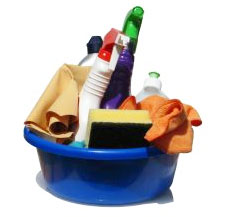Are you having a tough time getting your kids to do their chores? Should you pay your children to do their chores? Let's face it, chores are pretty darn boring, and if we had a choice, we probably wouldn't do it ourselves. Money, on the other hand, is a powerful motivator and incentive; however, this is a loaded topic filled with different opinions and valid points of view and arguments from both sides, so, you may want to think  it over carefully before deciding whether or not to use financial reward to entice your kids to do their chores. Keep in mind, though, that there is no right or wrong answer here, but simply a matter of choice, and choosing which you feel will work best for your family.
it over carefully before deciding whether or not to use financial reward to entice your kids to do their chores. Keep in mind, though, that there is no right or wrong answer here, but simply a matter of choice, and choosing which you feel will work best for your family.
Before we get into the reasons of why you should not pay your child to do chores, we'll quickly discuss some arguments FOR using money as a reward.
- It teaches children that money has to be earned and worked for.
- It provides an opportunity to teach our kids about earning money, saving money, and spending money.
- Money is a big motivator and a powerful incentive.
- It teaches children that if you work hard, you will get a reward - in this case, a financial reward.
Arguments Against Paying for Chores
- Children need to understand and appreciate the fact that as a member of the family, we all need to contribute in whatever ways we can. The child needs to know that we do things to help the family, and feel good about helping out. It is not just the parents "job" to take out the trash, do the dishes, or vacuum the house.
 Kids should not expect to get paid to take care of their belongings, pick up their toys, or clean their own rooms. Parents should do their best to prepare their children for the REAL world, where no one is going to pay you to make your own bed, take out the garbage, or scrub your own toilet.
Kids should not expect to get paid to take care of their belongings, pick up their toys, or clean their own rooms. Parents should do their best to prepare their children for the REAL world, where no one is going to pay you to make your own bed, take out the garbage, or scrub your own toilet.- The financial gains overshadow the good reasons of doing chores, and eventually, monetary gains become the sole reason or the main motivator of doing chores.
- It's never enough. Your child may demand more and more payment for their "services rendered" - they're always asking for a raise. Soon enough, they may not want to do chores regardless of how much they get paid.
- Paying for chores denigrates a child's inherent obligations to his or her family, and implies that there's a choice of doing or not doing the chores.
- Children will grow up and will make money elsewhere, and when their income outside the house increases, their desire and motivation to do house chores and their obligation to the family decreases.
In our family, we do not pay our kids to do their chores. We make it very clear to them that we're a family and we work as family - and being part of that family, we have our obligations and responsibilities, and we're very clear about what is expected of our children. However, there are situations where we do pay for certain chores that go above and beyond the ordinary call of duty which demand far more time and effort. For example, doing heavy duty gardening work, shoveling the driveway after a huge snow storm, or baby-sitting a younger sibling on a weekend.
We all have different views and opinions on this topic, and there isn't a right or wrong answer. Use common sense, and ultimately, it's up to the parents to decide what works best for their family.


 Watch a 2 year old toddler read, and see how this child's reading skill develops at 3 and 4 years old.
Watch a 2 year old toddler read, and see how this child's reading skill develops at 3 and 4 years old.